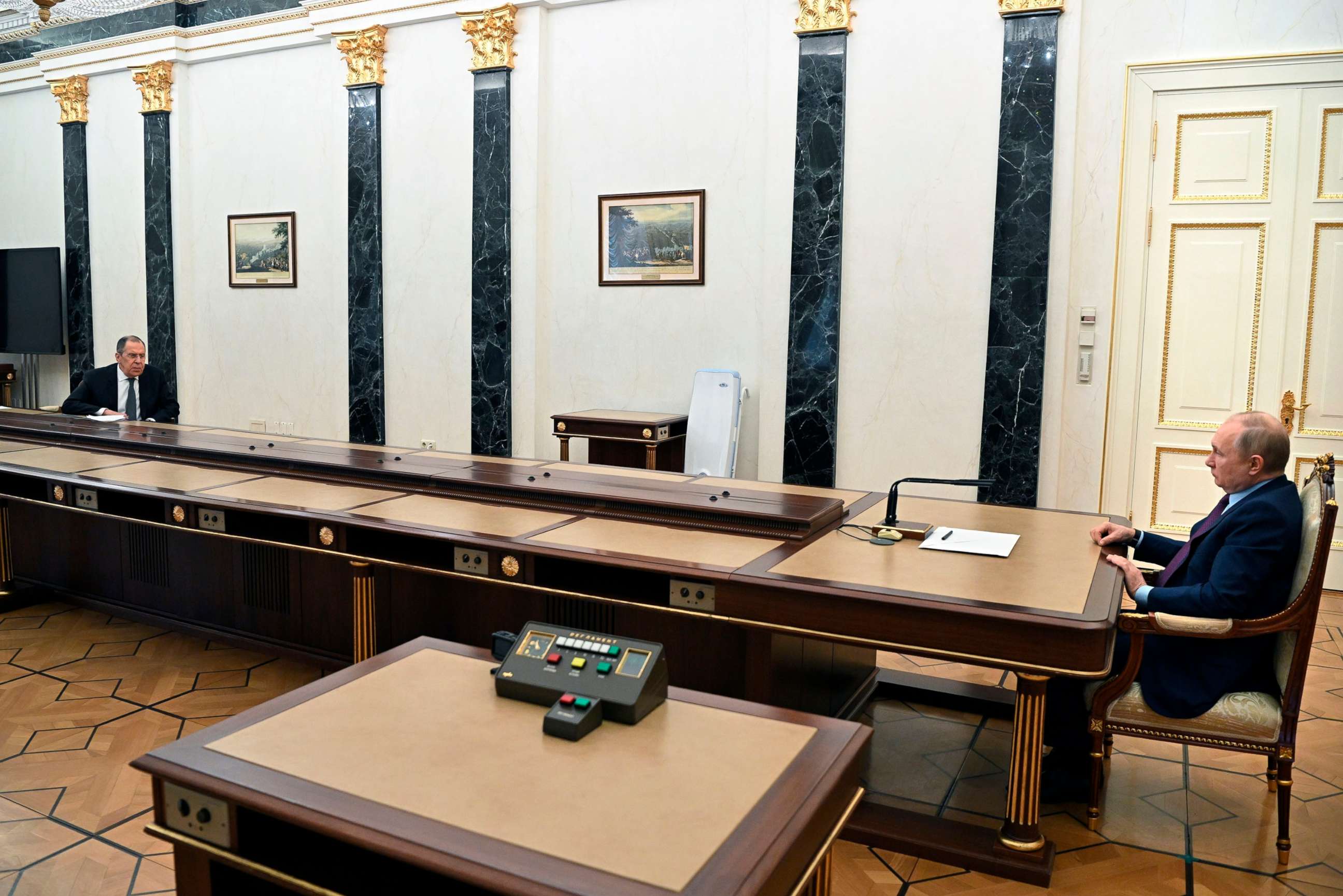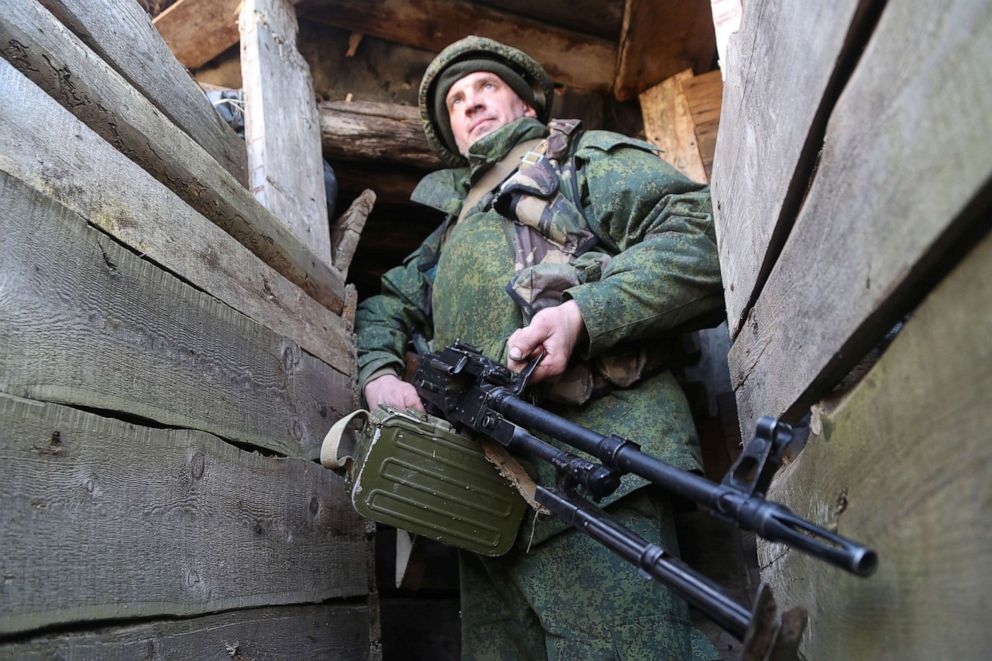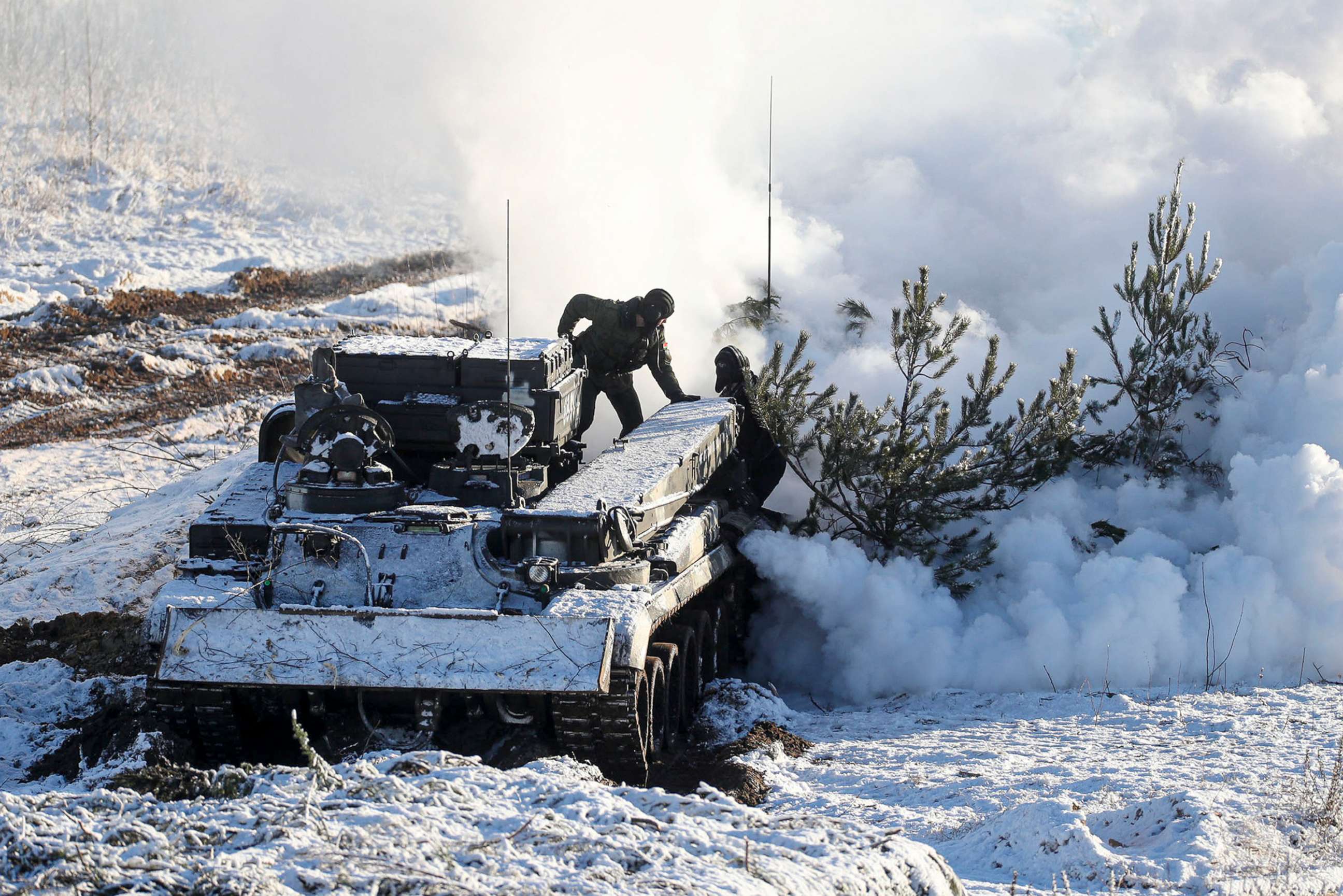Some Russian troops moved to firing positions near Ukraine, Putin said be ready by Feb. 16: Sources
If Russia attacks, the U.S. believes it would be quick and brutal, sources said.
While Russia's defense ministry said Tuesday that some forces would pull back from Ukraine's borders after completing military exercises, the U.S. has so far not seen that, President Joe Biden said in an address to the nation.
But worrying U.S. officials, Russians troops are instead moving forward closer to the line, including with medical supplies, and being put into firing positions, sources told ABC News.
The U.S. believes that Russia now has all the necessary pieces in place, including 150,000 troops in the region, to launch a swift and brutal invasion of Ukraine, the sources added -- the reason why Biden administration officials have now publicly been saying Russia could move "at any time."
In particular, ABC News has learned that Russian leader Vladimir Putin had told his military forces to be ready to go by Wednesday, Feb. 16, but it is still unclear whether he has made a decision to attack his neighbor.

The Russian government has denied any plans to invade Ukraine and repeatedly accused the U.S. of "hysteria" with these increasingly urgent warnings about one.
"After Russian troops finish drills and return to barracks, the West will declare 'diplomatic victory' by having 'secured' Russian 'de-escalation' -- a predictable scenario and cheap domestic political points," Russian Foreign Minister Sergei Lavrov said Saturday, according to the country's foreign ministry.
The U.S. believes an invasion would likely begin with electronic warfare and aerial bombardment against critical infrastructure, the sources said, followed by special operations forces entering Kyiv to decapitate the Ukrainian government and resupplying troops entering from Belarus -- with plans to complete their operations in 24 to 72 hours.
During his remarks Tuesday, Biden confirmed that Russian troops "remain very much in a threatening position" -- warning that an invasion remains "distinctly possible" and would inflict an "enormous" human toll.
But Biden said the U.S. would welcome Moscow pulling back its forces and engaging in diplomatic talks on U.S. and NATO proposals, on issues like arms control and transparency over military exercises.
While Lavrov said Moscow's response to those proposals would be transmitted in the coming days, Putin said that Russia's key demands were being ignored -- that Ukraine be barred from joining NATO and that the Western military alliance pull back its forces from Eastern European member states.
The U.S. and NATO have said those are nonstarters -- issues that only the alliance itself or individual countries can decide and not under Russian pressure.

"This is about more than just Russia and Ukraine. It's about standing for what we believe in, for the future that we want for our world, for liberty -- for liberty, the right of countless countries to choose their own destiny, and the right of people to determine their own futures, or the principle that a country can't change its neighbor's borders by force," Biden said at the White House.
Biden and Putin spoke Saturday -- their first conversation in over a month -- while their top diplomats Lavrov and Secretary of State Antony Blinken have spoken twice now in recent days. While the door to continued dialogue remains open, both sides have indicated, there are concerns Russia may resort to war even as it negotiates.
Russia already seized Ukrainian territory when it annexed Crimea in 2014, and since then, it has fomented a war against Ukrainian troops by arming and financing separatists in Ukraine's eastern provinces known as Donbas. Russian parliament passed a resolution Tuesday calling on Putin to recognize them as independent republics -- something Putin indicated he would not yet do.
But sources said if Russia attacks Ukraine, it would likely not be against a small slice of territory in Donbas, but a bloody, brutal, and swift campaign to topple President Volodymyr Zelenskyy's administration and install a puppet government.
Amid the heightened U.S. fears, the U.S. has also been concerned that the Zelenskyy's government hasn't responded quickly enough and isn't better prepared for a potential Russian invasion, sources said, including the positioning of its forces in eastern Ukraine.
U.S. officials have been urging better preparedness for two months now, the sources added, but President Zelenskyy and his inner circle have been both intent on staving off a panic and persistent in a belief that Moscow wouldn't invade.

While some U.S. officials doubt Putin is bluffing given the costs, financial and political, of the buildup, many analysts have been skeptical of dire U.S. assessments -- with some saying Putin is achieving his ultimate objective: destabilizing an increasingly democratic Ukraine aligned with the West.
"Putin has the hard experience of humiliation in Chechnya that tells him that while Russia might eventually be able to conquer Ukraine, they can’t hold it, and with any crossing of the border they will pay a very high price in blood and treasure," said retired Col. Stephen Ganyard, a former senior State Department official and now an ABC News contributor. "If he fails in Ukraine, it could be his rule that ends as well."
In particular, Ganyard said, a Russian invasion is still facing warm, wet weather conditions that make tank movements and aerial bombardment difficult, while the number of massed Russian troops still pales compared to Ukraine's forces, especially if Russian troops have to occupy a country the size of Texas.
Biden made clear the U.S. still hopes for a diplomatic off-ramp and for Putin to decide against invasion, even as they continue to make preparations for one -- from increased military aid for Ukraine, to coordination with European allies and others on sanctions.
Since Russia's buildup began, allies and partners have come together quickly to prepare a year's worth of sanctions work in the last six weeks, sources said, including export controls that could devastate Russia's economy.
But the U.S. is concerned that Russia could maintain its troop buildup and other ways of pressuring Ukraine short of taking military action -- and that that could start to splinter the Western coalition's unity.
Biden made reference to the economic pain that could be felt at home in the U.S., including elevated energy prices because of Russia's major role as an oil and gas exporter.
"But the American people understand that defending democracy and liberty is never without cost," Biden said -- adding his administration was taking "active steps to alleviate the pressure on our own energy markets."
ABC News's Luis Martinez, Matt Seyler, Ben Gittleson, and Molly Nagle contributed to this report.




